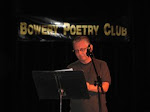skip to main |
skip to sidebar
BALIGH HAMDI
Like Mohamed Abdel Wahab before him, Egyptian composer Baligh Hamdi helped to modernize Arabic music, pushing at its boundaries through popular songs and music for film and television that sampled from western and other eastern ideas and instrumentation (saxophone, electric guitar, sitar, electronic keyboards) while steeped in the folkloric tradition he studied as a young adult.
Born in Cairo in 1931, Hamdi reputedly dedicated his life to becoming a composer before he was even a teen. He got his first major break in 1957 when Oum Kalthoum tracked him down through friend and fellow composer Muhammad Fawzi; Hamdi and Kalthoum collaborated on "Inta Feen wi-'l-Hubb Feen?" recorded in 1960 for Misrophon -- Hamdi subsequently wrote a new song for the diva nearly every year after that until her death in 1975.
Hamdi's work with Kalthoum was considered "light" in comparison to standbys Riad al-Sunbati and Zakariyya Ahmed, but Kalthoum knew that the younger composer brought her image a fresh appeal -- this is the period, after all, when electric guitarist Omar Khorshid became a permanent fixture of her orchestra.
Hamdi worked with all of the other major singers of the time, from Shadia and Faiza Ahmed to Abdel Halim Hafez, for whom he wrote the enduring "Mahwood" and "Khosara Khosara," which was sampled decades later by Timbaland for Jay-Z's "Big Pimpin'" -- the subject of a highly publicized copyright battle with Hamdi's family. (His work has been sampled by artists across at least three continents.)
Hamdi continued to write for up and coming singers -- Najat al-Saghira, Sabah, Hani Shaker, Warda (to whom he was married for nearly a decade), Mayada el-Hennawy, and Latifa, supporting and in some cases launching their careers.
This Wednesday night, from 7-10 PM EDT, Bodega Pop Live on WFMU's Give the Drummer Radio pays tribute to this towering figure of Arabic music, with a three-hour retrospective including rare live solo tracks, out of print collaborations and experimentation, and some of the hits that made him famous throughout the Arabic-speaking world.
Bookmark the page and see you Wednesday night!




























.jpg)






















































.jpg)



































No comments:
Post a Comment